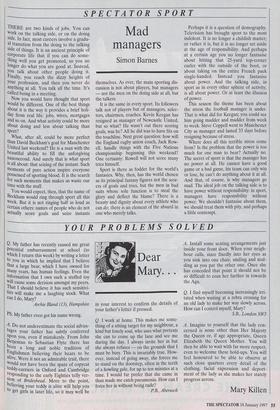SPECTATOR SPORT
Mad managers
Simon Barnes
THERE are two kinds of jobs. You can work on the talking side, or on the doing side. In fact, most careers involve a gradu- al transition from the doing to the talking side of things. It is an ancient principle of corporate life that if you can do some- thing well you get promoted, so you no longer do what you are good at. Instead, You talk about other people doing it. Finally, you reach the dizzy heights of Your profession, and then you never do anything at all. You talk all the time. It's called being in a meeting. Now you would have thought that sport would be different. One of the best things about it is the way it provides a brief holi- day from real life: jobs, wives, mortgages and so on. And what activity could be more about doing and less about talking than sport?
What, after all, could be more perfect than David Beckham's goal for Manchester United last weekend? He is a man with the beautiful ability to fill the unforgiving nanosecond. And surely that is what sport is all about: that seizing of the instant. Such moments of pure action inspire everyone possessed of sporting blood. It is the search for such moments that makes us waste our time with the stuff.
You would expect, then, that the name of Beckham would ring through sport all this week. But it is not ringing half as loud as certain others: names of people who do not actually score goals and seize instants themselves. As ever, the main sporting dis- cussion is not about players, but managers — not the men on the doing side at all, but the talkers.
It is the same in every sport. Its followers talk not of players but of managers, selec- tors, chairmen, coaches. Kevin Keegan has resigned as manager of Newcastle United, but so what? He wasn't out there scoring goals, was he? All he did was to have fits on the touchline. Next great question: how will the England rugby union coach, Jack Row- ell, handle things with the Five Nations championship beginning this weekend? One certainty: Rowell will not score many tries himself.
Sport is there as fodder for the world's fantasies. Why, then, has the world chosen as its principal fantasy figures not the scor- ers of goals and tries, but the men in bad suits whose sole function is to steal the glory and deflect the blame? There is a beauty and dignity about every athlete who can do; there is an element of the absurd in one who merely talks. Perhaps it is a question of demography. Television has brought sport to the most indolent. It is no longer a childish matter; or rather it is, but it is no longer set aside at the age of responsibility. And perhaps at a certain age you no longer fantasise about hitting that 25-yard top-corner curler with the outside of the boot, or about taking on the entire French pack single-handed. Instead you fantasise about power. And the talking side, in sport as in every other sphere of activity, is all about power. Or at least the illusion of power.
This season the theme has been about the stress the football manager is under. That is what did for Keegan; you could see him going madder and madder from week to week. Steve Coppell went to Manchester City as manager and lasted 33 days before resigning because of stress.
Where does all this terrible stress come from? Is the problem that the power is too much for one man to bear? Actually no. The secret of sport is that the manager has no power at all. He cannot have a good game or a bad game, his team can only win or lose, he can't do anything about it at all. And that, of course, is why managers go mad. The ideal job on the talking side is to have power without responsibility: in sport, managers have responsibility without power. We shouldn't fantasise about them, we should treat them with pity, and perhaps a little contempt.


























































 Previous page
Previous page